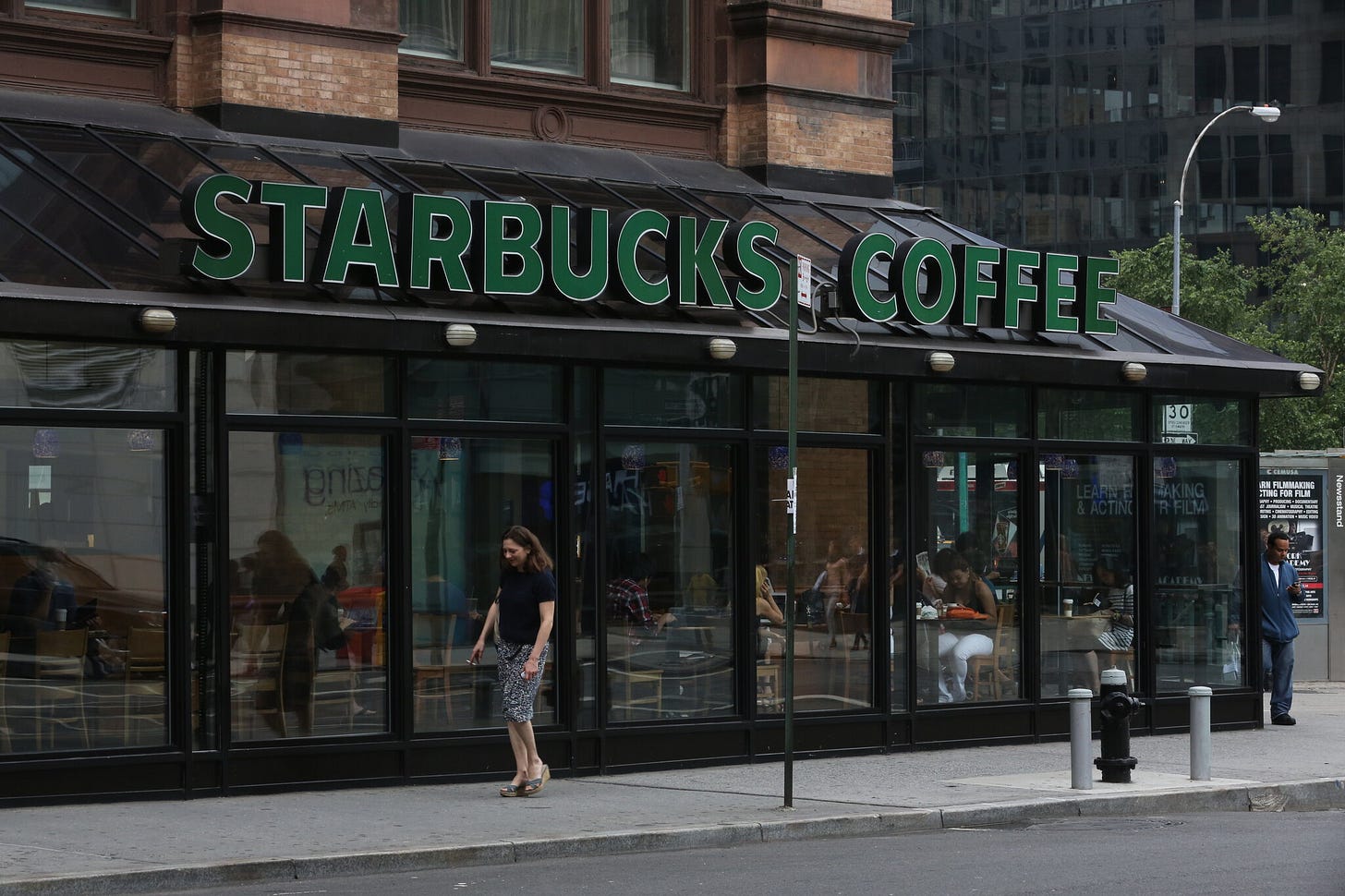04/29/2024: Starbucks, Starbucks, Starbucks, and an HOA
There are so many Starbucks cases. It boggles the mind.
Crystal Lakes Road and Recreation Association, 27-RC-339392 (Regional Election Decision)
The Machinists attempted to represent a unit of workers employed by a home owners association (HOA). The HOA argued that it is not subject to the NLRA because of its size and lack of interstate commerce. The regional director found that the employer met the NLRB's discretionary standard for asserting jurisdiction over homeowners' associations, which is $500,000 in annual gross revenues (Columbia Park and Recreation Association; Riverdale Manor Owners Corp.). The employer had over $1 million in annual assessment revenue. It also made more than de minimis interstate commerce purchases of $2,000 directly out-of-state and $1,885 in postage, meeting the interstate commerce requirement (Somerset Manor, Inc.). Accordingly, an election was directed for the petitioned-for unit.
Starbucks Corporation, 373 NLRB No. 44, 07-CA-293742 (Published Board Decision)
The Board affirmed the underlying administrative law judge (ALJ) decision that Starbucks engaged in numerous violations of Section 8(a)(1) in its Michigan stores during a union organizing campaign by Workers United in early 2022.
Starbucks District Manager Jennifer Gambone unlawfully solicited grievances and promised to remedy them in order to discourage union support, in violation of Section 8(a)(1). This occurred when Gambone met one-on-one with employee Alyssa Coakley shortly after the union filed a petition, which was an unusual meeting, and Gambone solicited and promised to address Coakley's concerns about COVID-19 safety measures. The ALJ and Board relied on cases establishing that soliciting grievances and promising benefits to influence employees' union support violates Section 8(a)(1) (MacDonald Machinery Co.).
Starbucks District Manager Paige Schmehl unlawfully threatened employees with reduced benefits, hours, and supervisory support if they voted for the union, in violation of Section 8(a)(1). Schmehl made statements that benefits would likely get worse in negotiations. The ALJ and Board found these statements unlawful because they were not based on objective facts (Ed Chandler Ford).
Schmehl unlawfully discriminated against union messaging on a store community bulletin board, in violation of Section 8(a)(1). During a union rally, Schmehl removed pro-union messages posted by customers while leaving other community postings. The ALJ relied on cases holding employers cannot discriminate against union content where they've designated a bulletin board for similar public postings (Mek Arden, LLC).
Starbucks Corporation, JD-24-24, 14-CA-306625 (ALJ Decision)
The administrative law judge (ALJ) concluded that Starbucks engaged in numerous violations of Section 8(a)(1) and 8(a)(3) at its Dale Avenue store in St. Louis, Missouri during a union organizing campaign and first contract negotiations in 2022 and early 2023.
Starbucks engaged in a variety of retaliatory actions, including retaliatory written warnings and retaliatory threats of demotion, against Brian Dooley because of his union activity. Applying the Wright Line standard, the ALJ found that the General Counsel met its initial burden by showing Dooley's union activity, Starbucks' knowledge of it, and animus based on the timing of the warning, lack of investigation, and baseless, unreasonable, and pretextual reasons given. Starbucks failed to meet its rebuttal burden.
Starbucks unlawfully enforced its dress code policy more strictly against employees involved in union activity and against union insignia. The ALJ found ample evidence that the dress code was not consistently enforced until employees collectively wore union t-shirts on October 24, 2022. This disparate enforcement violated Section 8(a)(1) (Shamrock Foods Co.; Stabilus, Inc.).
Starbucks unlawfully disciplined several employees for dress code violations on October 24 and after in retaliation for their union activity, again meeting the Wright Line standard based on the timing, disparate treatment, and other evidence of animus.
Starbucks unlawfully terminated employee Ryan Stoner for alleged misconduct that occurred while engaging in protected activity on October 24. Applying NLRB v. Burnup & Sims, Inc.,, the ALJ found Stoner did not engage in the alleged misconduct (swearing at managers), making Starbucks' motivation irrelevant. The ALJ also found the termination unlawful under Wright Line.
Starbucks unlawfully prohibited Ryan Stoner from recording a disciplinary meeting on October 24. The ALJ found the no-recording policy was unlawfully applied to restrict Section 7 activity under Whole Foods Market..
Lee Publications, Inc. d/b/a The Daily News of Longview, 19-RC-309505 (Unpublished Board Decision)
The Board affirmed the regional director’s decision to direct an election for the petitioned-for unit, though it’s analysis of the community-of-interest factors for determining whether a petitioned-for unit is appropriate was slightly different than the regional director’s analysis of those factors.
Detroit Education & Research, 07-RC-316218 (Regional Election Decision)
The union, AFT, sought to represent a unit of interns, resident physicians, and medical fellows employed by Detroit Education & Research. The employer raised a number of objections to this.
The employer argued there was a disqualifying conflict of interest because Designated Institutional Officials (DIOs), Specialists in Chief, and Program Directors who supervise the petitioned-for residents were members of a different union, the Wayne Academic Union (WAU), which like the Petitioner is affiliated with AFT-Michigan, AFL-CIO. The Employer argued this would create divided loyalties. The regional director applied Sierra Vista Hospital, finding the employer failed to meet the "heavy burden" to show a "clear and present danger" to the collective bargaining process from the alleged conflict.
The employer argues that employees in their final year of medical residency should be excluded as temporary. The regional director relied on Boston Medical Center, rejecting an argument that residents were temporary due to their finite residency terms, as well as Marian Medical Center, finding the residents did not have a set end date to their employment.
Starbucks Corporation, 01-CA-299987 (Unpublished Board Decision)
The underlying administrative law judge (ALJ) decision found that Starbucks committed various unfair labor practices. Starbucks did not file any exceptions to that decision (i.e. appeal the decision) in the twenty-day time limit required by Section 10(c) so the Board adopted the ALJ’s decision as its own.

